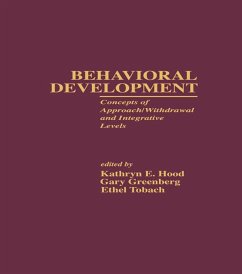Behavioral Development (eBook, ePUB)
Concepts of Approach/Withdrawal and Integrative Levels
Redaktion: Hood, Kathryn E.; Tobach, Ethel; Greenberg, Gary
41,95 €
41,95 €
inkl. MwSt.
Sofort per Download lieferbar

21 °P sammeln
41,95 €
Als Download kaufen

41,95 €
inkl. MwSt.
Sofort per Download lieferbar

21 °P sammeln
Jetzt verschenken
Alle Infos zum eBook verschenken
41,95 €
inkl. MwSt.
Sofort per Download lieferbar
Alle Infos zum eBook verschenken

21 °P sammeln
Behavioral Development (eBook, ePUB)
Concepts of Approach/Withdrawal and Integrative Levels
Redaktion: Hood, Kathryn E.; Tobach, Ethel; Greenberg, Gary
- Format: ePub
- Merkliste
- Auf die Merkliste
- Bewerten Bewerten
- Teilen
- Produkt teilen
- Produkterinnerung
- Produkterinnerung

Bitte loggen Sie sich zunächst in Ihr Kundenkonto ein oder registrieren Sie sich bei
bücher.de, um das eBook-Abo tolino select nutzen zu können.
Hier können Sie sich einloggen
Hier können Sie sich einloggen
Sie sind bereits eingeloggt. Klicken Sie auf 2. tolino select Abo, um fortzufahren.

Bitte loggen Sie sich zunächst in Ihr Kundenkonto ein oder registrieren Sie sich bei bücher.de, um das eBook-Abo tolino select nutzen zu können.
First Published in 1995. Routledge is an imprint of Taylor & Francis, an informa company.
- Geräte: eReader
- mit Kopierschutz
- eBook Hilfe
- Größe: 8.31MB
Andere Kunden interessierten sich auch für
![Affect Regulation, Mentalization and the Development of the Self (eBook, ePUB) Affect Regulation, Mentalization and the Development of the Self (eBook, ePUB)]() Affect Regulation, Mentalization and the Development of the Self (eBook, ePUB)45,95 €
Affect Regulation, Mentalization and the Development of the Self (eBook, ePUB)45,95 €![Contemporary Career Development Issues (eBook, ePUB) Contemporary Career Development Issues (eBook, ePUB)]() Contemporary Career Development Issues (eBook, ePUB)23,95 €
Contemporary Career Development Issues (eBook, ePUB)23,95 €![Behavioral Activation (eBook, ePUB) Behavioral Activation (eBook, ePUB)]() Jonathan W. KanterBehavioral Activation (eBook, ePUB)20,95 €
Jonathan W. KanterBehavioral Activation (eBook, ePUB)20,95 €![Therapeutic Consultations in Child Psychiatry (eBook, ePUB) Therapeutic Consultations in Child Psychiatry (eBook, ePUB)]() Donald W. WinnicottTherapeutic Consultations in Child Psychiatry (eBook, ePUB)51,95 €
Donald W. WinnicottTherapeutic Consultations in Child Psychiatry (eBook, ePUB)51,95 €![Boundary and Space (eBook, ePUB) Boundary and Space (eBook, ePUB)]() Madeleine DavisBoundary and Space (eBook, ePUB)45,95 €
Madeleine DavisBoundary and Space (eBook, ePUB)45,95 €![Elements of Self-Destruction (eBook, ePUB) Elements of Self-Destruction (eBook, ePUB)]() Brent PotterElements of Self-Destruction (eBook, ePUB)33,95 €
Brent PotterElements of Self-Destruction (eBook, ePUB)33,95 €![Dialogical Meetings in Social Networks (eBook, ePUB) Dialogical Meetings in Social Networks (eBook, ePUB)]() Tom Erik ArnkilDialogical Meetings in Social Networks (eBook, ePUB)38,95 €
Tom Erik ArnkilDialogical Meetings in Social Networks (eBook, ePUB)38,95 €-
-
-
First Published in 1995. Routledge is an imprint of Taylor & Francis, an informa company.
Dieser Download kann aus rechtlichen Gründen nur mit Rechnungsadresse in A, B, BG, CY, CZ, D, DK, EW, E, FIN, F, GR, HR, H, IRL, I, LT, L, LR, M, NL, PL, P, R, S, SLO, SK ausgeliefert werden.
Produktdetails
- Produktdetails
- Verlag: Taylor & Francis eBooks
- Seitenzahl: 492
- Erscheinungstermin: 26. November 2013
- Englisch
- ISBN-13: 9781135575335
- Artikelnr.: 40097308
- Verlag: Taylor & Francis eBooks
- Seitenzahl: 492
- Erscheinungstermin: 26. November 2013
- Englisch
- ISBN-13: 9781135575335
- Artikelnr.: 40097308
- Herstellerkennzeichnung Die Herstellerinformationen sind derzeit nicht verfügbar.
Hood, Kathryn E.; Greenberg, Gary; Tobach, Ethel
Series Editors' Preface
Introduction
I. The Concept of Approach/Withdrawal as Fundamental to the Analysis of Behavioral Development
1. The Historical Development of the Approach/Withdrawal Concept
2. Dialectical and Dynamical Systems of Approach and Withdrawal: Is Fighting a Fractal Form?
3. Approach/Withdrawal Theory and Comparative Psychology
4. Schneirla's A/W Biphasic Processes Theory
II. Approach/Withdrawal-Biochemical and Neural Processes
5. Cellular and Network Processes Involved in Biphasic Responses to Noxious Stimulation in Aplysia: Prospects for a Reductionist Analysis
6. Nerve Growth Factor and Cholinergic Development: Biochemical Levels in Approach/Withdrawal Processes
7. What and Where Are Memories?
III. Approach/Withdrawal-Socialization
8. An Analysis of Approach/Withdrawal Processes in the Initiation of Maternal Behavior in the Laboratory Rat
9. The Mediation of Aggressive Behavior in Mice: A Discussion of Approach/Withdrawal Processes in Social Adaptations
10. Beyond Attachments: Toward a General Theory of the Development of Relationships in Infancy
IV. Approach/Withdrawal and Individual Differences
11. The Approach/Withdrawal Concept: Associations with Salient Constructs in Contemporary Theories of Temperament and Personality Development
12. Approach/Withdrawal Processes in Infancy: The Relationship between Parasympathetic Tone and Infant Temperament
V. The Concept of Levels in Approach/Withdrawal Theory
13. One View of the Concept of Integrative Levels
14. The Concept of Levels of Integration
15. Definitions of Levels of Integration
16. The Integration of Levels and Human Development: A Developmental Contextual View of the Synthesis of Science and Outreach in the Enhancement of Human Lives
Epilogue
Contributors
Index
Introduction
I. The Concept of Approach/Withdrawal as Fundamental to the Analysis of Behavioral Development
1. The Historical Development of the Approach/Withdrawal Concept
2. Dialectical and Dynamical Systems of Approach and Withdrawal: Is Fighting a Fractal Form?
3. Approach/Withdrawal Theory and Comparative Psychology
4. Schneirla's A/W Biphasic Processes Theory
II. Approach/Withdrawal-Biochemical and Neural Processes
5. Cellular and Network Processes Involved in Biphasic Responses to Noxious Stimulation in Aplysia: Prospects for a Reductionist Analysis
6. Nerve Growth Factor and Cholinergic Development: Biochemical Levels in Approach/Withdrawal Processes
7. What and Where Are Memories?
III. Approach/Withdrawal-Socialization
8. An Analysis of Approach/Withdrawal Processes in the Initiation of Maternal Behavior in the Laboratory Rat
9. The Mediation of Aggressive Behavior in Mice: A Discussion of Approach/Withdrawal Processes in Social Adaptations
10. Beyond Attachments: Toward a General Theory of the Development of Relationships in Infancy
IV. Approach/Withdrawal and Individual Differences
11. The Approach/Withdrawal Concept: Associations with Salient Constructs in Contemporary Theories of Temperament and Personality Development
12. Approach/Withdrawal Processes in Infancy: The Relationship between Parasympathetic Tone and Infant Temperament
V. The Concept of Levels in Approach/Withdrawal Theory
13. One View of the Concept of Integrative Levels
14. The Concept of Levels of Integration
15. Definitions of Levels of Integration
16. The Integration of Levels and Human Development: A Developmental Contextual View of the Synthesis of Science and Outreach in the Enhancement of Human Lives
Epilogue
Contributors
Index
Series Editors' Preface
Introduction
I. The Concept of Approach/Withdrawal as Fundamental to the Analysis of Behavioral Development
1. The Historical Development of the Approach/Withdrawal Concept
2. Dialectical and Dynamical Systems of Approach and Withdrawal: Is Fighting a Fractal Form?
3. Approach/Withdrawal Theory and Comparative Psychology
4. Schneirla's A/W Biphasic Processes Theory
II. Approach/Withdrawal-Biochemical and Neural Processes
5. Cellular and Network Processes Involved in Biphasic Responses to Noxious Stimulation in Aplysia: Prospects for a Reductionist Analysis
6. Nerve Growth Factor and Cholinergic Development: Biochemical Levels in Approach/Withdrawal Processes
7. What and Where Are Memories?
III. Approach/Withdrawal-Socialization
8. An Analysis of Approach/Withdrawal Processes in the Initiation of Maternal Behavior in the Laboratory Rat
9. The Mediation of Aggressive Behavior in Mice: A Discussion of Approach/Withdrawal Processes in Social Adaptations
10. Beyond Attachments: Toward a General Theory of the Development of Relationships in Infancy
IV. Approach/Withdrawal and Individual Differences
11. The Approach/Withdrawal Concept: Associations with Salient Constructs in Contemporary Theories of Temperament and Personality Development
12. Approach/Withdrawal Processes in Infancy: The Relationship between Parasympathetic Tone and Infant Temperament
V. The Concept of Levels in Approach/Withdrawal Theory
13. One View of the Concept of Integrative Levels
14. The Concept of Levels of Integration
15. Definitions of Levels of Integration
16. The Integration of Levels and Human Development: A Developmental Contextual View of the Synthesis of Science and Outreach in the Enhancement of Human Lives
Epilogue
Contributors
Index
Introduction
I. The Concept of Approach/Withdrawal as Fundamental to the Analysis of Behavioral Development
1. The Historical Development of the Approach/Withdrawal Concept
2. Dialectical and Dynamical Systems of Approach and Withdrawal: Is Fighting a Fractal Form?
3. Approach/Withdrawal Theory and Comparative Psychology
4. Schneirla's A/W Biphasic Processes Theory
II. Approach/Withdrawal-Biochemical and Neural Processes
5. Cellular and Network Processes Involved in Biphasic Responses to Noxious Stimulation in Aplysia: Prospects for a Reductionist Analysis
6. Nerve Growth Factor and Cholinergic Development: Biochemical Levels in Approach/Withdrawal Processes
7. What and Where Are Memories?
III. Approach/Withdrawal-Socialization
8. An Analysis of Approach/Withdrawal Processes in the Initiation of Maternal Behavior in the Laboratory Rat
9. The Mediation of Aggressive Behavior in Mice: A Discussion of Approach/Withdrawal Processes in Social Adaptations
10. Beyond Attachments: Toward a General Theory of the Development of Relationships in Infancy
IV. Approach/Withdrawal and Individual Differences
11. The Approach/Withdrawal Concept: Associations with Salient Constructs in Contemporary Theories of Temperament and Personality Development
12. Approach/Withdrawal Processes in Infancy: The Relationship between Parasympathetic Tone and Infant Temperament
V. The Concept of Levels in Approach/Withdrawal Theory
13. One View of the Concept of Integrative Levels
14. The Concept of Levels of Integration
15. Definitions of Levels of Integration
16. The Integration of Levels and Human Development: A Developmental Contextual View of the Synthesis of Science and Outreach in the Enhancement of Human Lives
Epilogue
Contributors
Index







